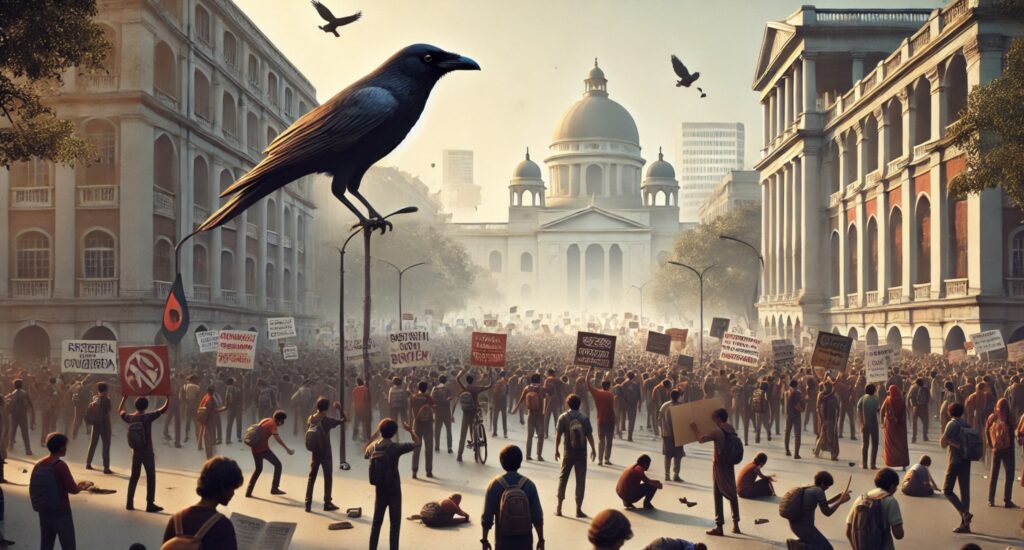Narrative Attacks Contribute to Unrest Across Bangladesh
What began as a student protest against the reinstatement of a controversial job quota system – which students maintain unfairly benefited the ruling party – quickly turned violent once the government employed aggressive tactics and spread narrative attacks to stifle dissent.

This research was published on August 2nd, 2024. For updated reporting, read this post.
In June, the High Court of Bangladesh ruled to reinstate a controversial job quota system previously abolished following a 2018 protest movement. Declaring that the job quota system – which reserves 30% of government jobs for descendants of veterans who fought in the 1971 War of Independence against Pakistan – favored supporters of the ruling Awami League party and should instead be based on merit, students began protesting in response.
The demonstrations were peaceful until July 15, when the student wing of the Awami League, the Chhatra League, carried out coordinated attacks against protesters, reportedly using rods, sticks, and firearms as weapons. Protesters interpreted the violent provocations to be the government’s reaction to the protests because the Chhatra League operates under the direction of Bangladesh Prime Minister Sheikh Hasina, and she appoints its student leaders.
LEARN: What Is Narrative Intelligence?
The Chhatra League, police, and paramilitary groups escalated violence against the protesters through the use of rubber bullets and tear gas, with some reports suggesting the use of lethal weapons. Casualty counts circulated online, further stoking the fire fueling the protests. Over a hundred deaths and thousands of injuries have been confirmed, though reports suggest the casualty count is much higher. At one hospital in Dhaka, the nation’s capital, more than 150 students were treated for injuries from rubber bullets, and another Dhaka hospital received 27 bodies in one day during the unrest.
Videos and images of the clashes between protesters and pro-government groups and security forces emerged and were shared on social media platforms. Human rights organizations condemned the violence and called on the government of Bangladesh to investigate the brutality and halt mass arrests. The protests born of frustration with rising unemployment rates and the desire for quota reform evolved into a larger movement, fueled by narrative attacks and by sustained anger over the numerous deaths, injuries, and arrests.
Then, communication went silent. Starting on July 18, the government ordered a nationwide internet shutdown. The day after the internet blackout began, the government implemented a nationwide curfew enforced by the police and the military, which was given “shoot-on-sight” orders, even though the government insisted that no permission was given to shoot at people. While internet services were interrupted, on July 21, the Supreme Court of Bangladesh walked back the ruling that had reinstated the quotas, declaring that 93% of government jobs would be recruited on merit, with only 5% reserved for veterans’ relatives.
Even though the quota system was reduced, protests continued in response to the violent measures taken by the government to quell the unrest. The government took advantage of the situation and attempted to use the power of controlling the flow of information to its advantage, launching several narrative attack-powered narrative attacks. Compass by Blackbird.AI checked and contextualized all claims in this post, providing crucial information about this rapidly evolving situation.
NARRATIVE ATTACK 1: The internet was shut down in Bangladesh because the internet infrastructure was vandalized.
The government launched a narrative attack claiming that the internet services across the country were disrupted solely due to vandalism. In contrast, network service companies indicated that the shutdown was government-directed in response to the protests. Bangladesh State Minister for Information and Broadcasting Mohammed Arafat blamed “terrorists” who “invaded” the protests for the internet outage, claiming that a “third party” set fire to the National Data Center and vandalized fiber-optic cables in other parts of the country.
Bangladesh State Minister for Posts, Telecommunication, and Information Technology Zunaid Ahmed Palak said the government implemented the shutdown of mobile networks to limit the spread of “fake news.” Though broadband internet service was restored on July 25, and mobile networks were reinstated on July 28, disruptions to social media and mobile data continue.
This is not the first time that the government has responded to unrest by imposing internet restrictions. During protests in 2018, authorities similarly shut down the internet to limit the ability of protesters to mobilize and spread information.
NARRATIVE ATTACK 2: Opposition parties manipulate the protests to sow chaos and destabilize the government.
Launching another narrative attack, the government asserted that opposition parties are behind the unrest and are vandalizing government infrastructure. To support claims that opposition parties are using the protests to destabilize the government, charges have been brought against members of the two main opposition parties, the Bangladesh Nationalist Party (BNP) and Bangladesh Jamaat-e-Islami (Jamaat), which the government accused of inciting violence during the protests.
Members of both parties were among the more than 3,000 arrested. On August 1, Prime Minister Hasina and her administration officially banned Jamaat and its student wing, Islami Chhatra Shibir, labeling the party and its affiliates as terrorist organizations and militants. Jamaat has denied allegations of inciting violence, claiming the government is using the ban to suppress opposition voices.
NARRATIVE ATTACK 3: The spread of anti-government misinformation on social media led to violence and must be controlled.
In a third narrative attack attempting to control the flow of information, the government contended that anti-government misinformation spreading on social media platforms led to violence and must be better controlled. Bangladesh State Minister for Posts, Telecommunication and Information Technology Palak has accused social media platforms of using “anti-government” bias fact-checkers, claiming that pro-government posts were being suppressed while anti-government misinformation was spreading unchecked.
On August 2, some social media sites were made inaccessible on mobile data following unofficial regulatory instruction by the government. These sites can be accessed through a VPN, but Palak argued that widespread VPN usage across the country contributed to reduced internet speeds and cyber attacks. While VPNs can introduce certain vulnerabilities, they enhance security and privacy by concealing users’ IP addresses and web traffic. Palak’s statements urging people not to use a VPN indicate a possible effort by the Bangladeshi authorities to limit people’s ability to counteract narrative attacks coming from the government.
The Way Forward
As the student-led quota reform protests turned into an uprising against the current administration, arguing that Prime Minister Hasina has become increasingly more autocratic throughout her 14 years in power. The government continues to lean into the tools at its disposal to control the narrative through narrative attacks and threats. Demonstrators rejected a video statement from six student protest organizers in the custody of the Detective Branch of the police, saying it was coerced. Through police raids and detentions without any formal charges, authorities have harassed and intimidated families of human rights defenders living abroad to try to silence their activism. The government’s intimidation tactics contribute to concerns that messages sent in encrypted online messaging channels are not private. When situations like the unrest in Bangladesh evolve quickly and face complications inhibiting the flow of factual information, narrative attacks can easily be weaponized to instigate narrative attacks.
To learn more about how Blackbird.AI can help you with election integrity, book a demo.
Need help protecting your organization?
Book a demo today to learn more about Blackbird.AI.



